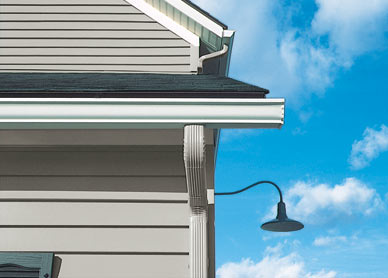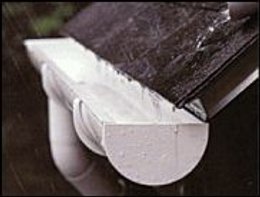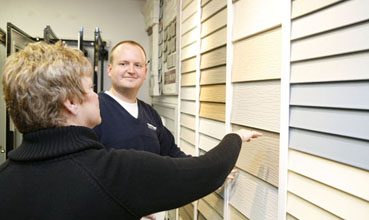What Home Improvement Superstores Don't Want You To Know About Your Gutters
By JR Girskis
Gutter Homepage
Gutters are anything but glamorous, but they do serve a valuable purpose: managing rainwater and moisture, and routing it from your roof and away from your house. With a quality gutter system, a house will remain dry, and its siding, doors, windows, and foundation will be thoroughly protected from water damage. Granted, some roofs with broad overhangs do no require gutters, but most roofs do. What home improvement superstores don't want you to know is that their vinyl or plastic gutters they advertise as "Easily installed by anyone" systems usually are inadequate as far as flow and rain capacity goes. They also must be installed with the correct "pitch" or you will experience poor drainage, blockage and erosion of the ground below the gutters.

Before You Buy Your Gutter System
Talk with your neighbors and friends to find out whether they're happy with their current gutters and whether they can recommend a specific type of gutter system. Before investing in gutters, you'll want to consider the pros and cons of the various gutters on the market today:Wood Gutters:
Once the most popular gutter system, wood gutters are now fairly rare, except in restoration work. Depending on the wood type, wood gutters can also be very expensive, running anywhere from $12 to $20 per linear foot.
Aluminum Gutters:
The most common gutters on the market, aluminum gutters hold much more water than wood gutters, although they tend to lose their shape when a ladder is pressed against them. When buying aluminum gutters, be sure to choose the thickest aluminum available. Keep in mind that primary aluminum is usually thicker and more consistent than secondary (recycled) aluminum.
Vinyl and Plastic Gutters:
You must install these yourself and can be fairly inexpensive. Vinyl and plastic gutters do not rust or rot. One disadvantage, however, is that they can become brittle over time or during harsh winters. Additionally, they usually will leak at the seams over time without constant maintenance. With couplings, hangers, brackets, and downspouts, on average vinyl or plastic gutters will run you $3 to $5 per linear foot. Sometimes this price is in line with a commercial provider without the hassle of doing it yourself.
Installing Vinyl Gutters
The following are step-by-step instructions for do-it-yourself vinyl rain gutter installation.Required tools:
a.) Ladderb.) Chalk
c.) Tape measure
d.) Levels
e.) Power drill with screwdriver bits
f.) Fine-toothed hacksaw
g.) Galvanized screws
h.) Vinyl gutter, hangers, elbows, connectors, downspouts, drop outlets, and corners
To catch run-off water, gutters need to be installed so that the edge of the roof falls over the middle of the gutter. In this position, the gutter will catch any water that flows off the roof. Your gutters should also gently slope from end to end so that rainwater will flow to the downspout and away from your home. If possible, you'll want to position the gutter so that the water flows to a hard surface such as a driveway. After determining the design of your gutters, measure your roof to determine how many gutter pieces you will need. Vinyl gutters usually come in 10-foot sections.
Next, measure one-half inch from the end of the gutter, away from the downspout and mark the spot with chalk. One-half inch from the downspout location, place another chalk mark; making sure this mark is level with the first one. Snap a chalk line between the two marks. Place your ladder against the house and install the gutter-system components, including drop outlets and corners, from there. Check your manufacturer's instructions to determine how far apart you'll space your mounting brackets or hangers. (Usually this will be between 24 and 30 inches.) Make sure that you align all components with the chalk line you made earlier as your reference line.

Snap the gutter sections into the hangers or brackets and join the sections with your connectors. With the hacksaw, cut any sections you need to finish the run into the lengths you need. At the bottom of the drop outlet, install the elbows, then cut and install the downspout sections to the drop outlet base and fasten the drop outlet base to the house.
Before considering doing the work yourself, call a professional regarding installing your gutter system. Installing vinyl gutters may not be as easy as you might think but it may save you a few hundred dollars although your labor is not included.
For further reading please see our Learn the Basics Homepage


